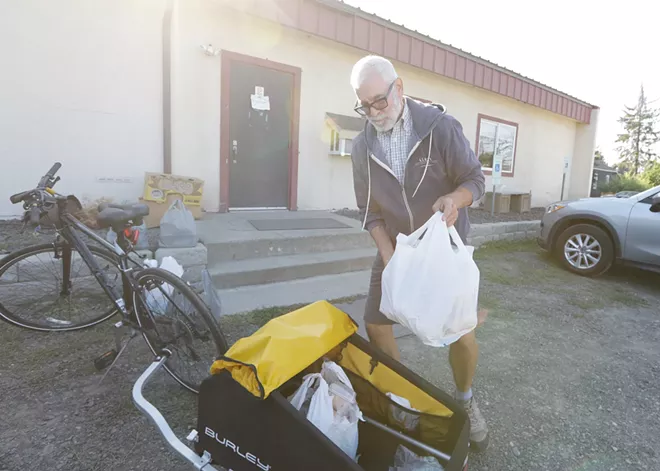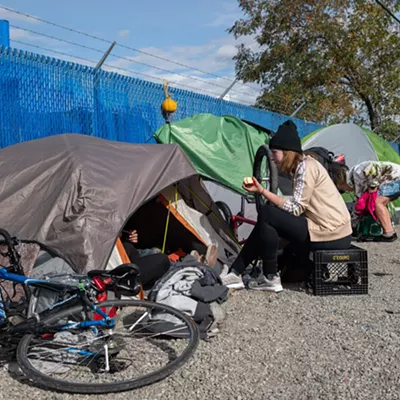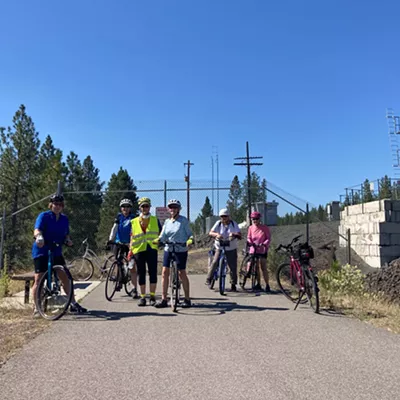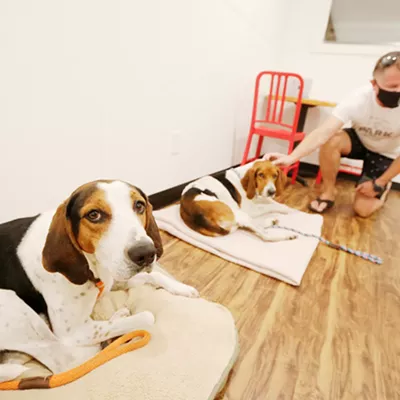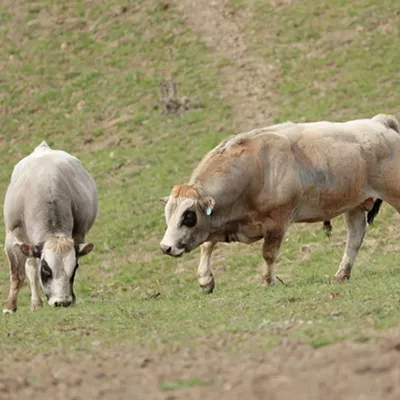By 8:15 on Tuesday morning, people are waiting in front of Family of Faith Community Church in northwest Spokane. Three women lean against a chain link fence. A few men space themselves out along a cement retaining wall in the shade. The side of the church advertises Celebrate Recovery, a 12-step addiction treatment program. It's quiet. The cool of the morning is already wearing off, and you can tell it's going to be hot.
At 8:20, Timothy Diko bikes into the parking lot. He greets some people waiting but goes around the corner and knocks on a side door. He double-checks the orders on his phone until a woman opens the door and ushers him into a room full of bread, fruit, yogurt and cookies.
Every Tuesday morning, Family of Faith organizes a free food pantry for the Emerson-Garfield neighborhood. People walk, bike and drive to the pantry to supplement their food for the week. But some community members are missing — people dealing with food insecurity and mobility issues can't get to the food pantry itself, compounding their struggle to put food on the table.
That's where Diko comes in. Diko volunteers with Growing Neighbors, a nonprofit getting creative about how to feed a healthy neighborhood. Growing Neighbors' latest initiative recruits community members to deliver food pantry items via bikes to people who struggle to leave their homes. It encourages mobile people to be more active, helps communities be more aware of their neighbors' needs, and organically fills in the cracks where food services may come up short.
Growing Neighbors already has bikes, trailers, routes and relationships with food pantries. Its main issue is finding people to put the pedal to the, well, gear chain.
Diko gets to fill his bike trailer with food before the church doors officially open for the crowd gathering outside. Inside, the narthex smells slightly of overripe fruit.
Every week, Diko delivers to two households, plus a little free pantry — one of the birdhouse-esque cabinets in various front lawns filled with nonperishables food items for the taking.
He has text messages from the people he brings food to, explaining what they need the most. Both appreciate fresh produce, especially fruit.
"Love a fresh lime," Diko says, as he peruses a stack of green citrus for the firmest fruits, rolling a few into the plastic bags that hang from both his arms.
The pantry has lots of eggs this week, so Diko carefully places a precious carton into each tote. He also makes sure to grab pasta, beans and a bag of Milano cookies for the mini pantry.
James Dunkin walks in from the sanctuary. Dunkin runs the pantry for Family of Faith. Previously an addict and a graduate of Celebrate Recovery, Dunkin now spends his time operating various programs out of the church, which also include addiction support, homeless shelters and a K-12 school. He has a fiery red beard and wears a trucker hat.
"Rosauers blessed us with 70 gallons of milk," he calls to the room. "Make sure everyone gets milk."
Diko's bags are full. He weighs them before leaving, then carries them out to his bike trailer. It's about half the size of trailers parents use to tote toddlers.
"This is always the hard part, juggling these things," he says. "The fruit I hate to smash too much."
Diko is lean and well-groomed, an ESL teacher who retired a few years early. He first came to Eastern Washington with the military and spent a few years on Fairchild Air Force base. Then, he went to school, getting degrees in Spanish and ESL, and wound up teaching English in the Middle East for a decade.
He came back to Spokane and taught at Mukogawa Women's University's extension campus, as well as ESL classrooms for refugees through the International Rescue Committee.
"I'm trying to do things in my neighborhood," he says. "The world's a broken place. So it needs a lot of helpers to come forward and do some of the work."
Diko is careful to place the eggs on the very top, where they're the least likely to get crushed when he pulls the trailer's yellow top on. The cover is tight, and the trailer is bulky, but the whole thing glides pretty easily as Diko pedals onto the street.
"I feel like it's part of the exchange for society's helping me in different ways," he says. "None of us are doing this all by ourselves. We're mutually dependent and interdependent on everybody and everything in society. Making society better — it is all of our jobs."
G
Wanna get involved with food deliveries, community gardening, cooking workshops or other activities? See what Growing Neighbors is doing in your neighborhood at growingneighbors.wordpress.com or email growingneighbors509@gmail.com for updates.
Growing Neighbors' leaders kept wondering about more ways to minimize fossil fuels, maximize physical activity and strengthen each neighborhoods' social capital — the kind of support network that healthy families often provide, like bringing meals to someone who's sick or just had a baby, or dropping off groceries to a grandparent who's more comfortable at home.
Edmonson sees bicycle food deliveries as another way to encourage neighbors to act more like family.
"I know there's a ton of people around that love to ride bikes, and also love to help their neighbors and love to feed people," Edmonson says. "We just have to kind of bring it all together."
Diko's first stop is a one-level house a few blocks away from Family of Faith. He places a couple bags on the doorstep, rings the bell and opens the carton of eggs. A couple of the eggs cracked, and Diko is embarrassed, lifting his cap and rubbing his forehead in despair.
An old woman and a young child answer the doorbell. She pulls the bags inside as the boy clings to her calf, and Diko apologizes for the broken eggs.
"No problem," she assures him. "We'll eat them right now."
Diko continues on his route, his trailer getting lighter as local families get a little fuller. ♦

